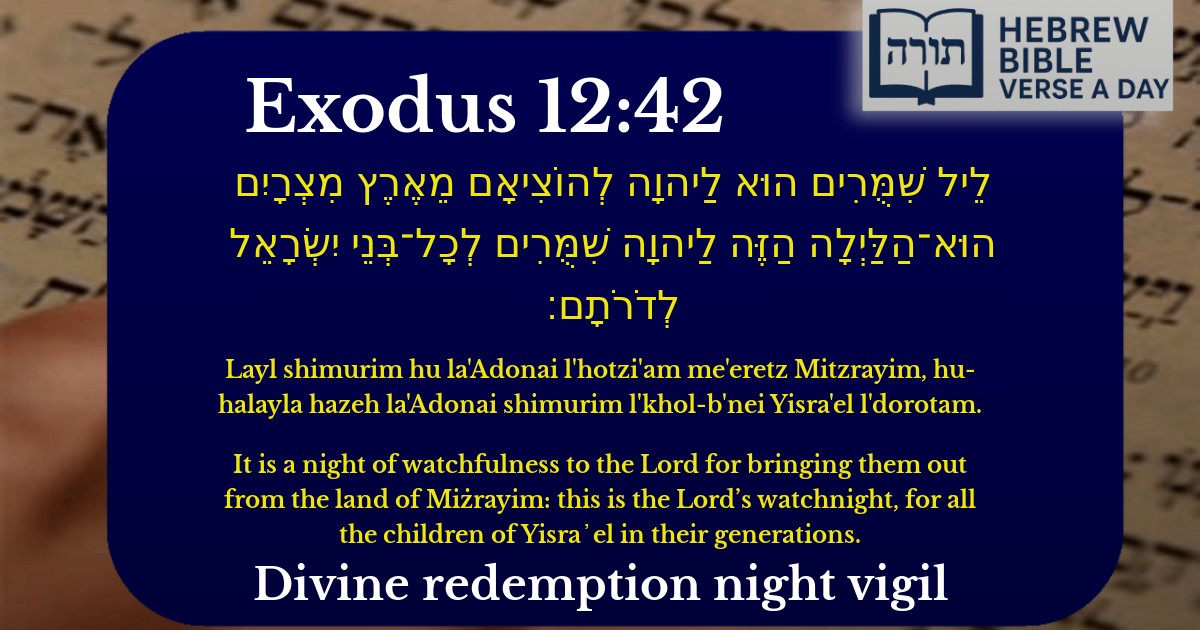Join Our Newsletter To Be Informed When New Videos Are Posted
Join the thousands of fellow Studends who rely on our videos to learn how to read the bible in Hebrew for free!
Hebrew Text
לֵיל שִׁמֻּרִים הוּא לַיהוָה לְהוֹצִיאָם מֵאֶרֶץ מִצְרָיִם הוּא־הַלַּיְלָה הַזֶּה לַיהוָה שִׁמֻּרִים לְכָל־בְּנֵי יִשְׂרָאֵל לְדֹרֹתָם׃
English Translation
It is a night of watchfulness to the Lord for bringing them out from the land of Miżrayim: this is the Lord’s watchnight, for all the children of Yisra᾽el in their generations.
Transliteration
Layl shimurim hu la'Adonai l'hotzi'am me'eretz Mitzrayim, hu-halayla hazeh la'Adonai shimurim l'khol-b'nei Yisra'el l'dorotam.
Hebrew Leining Text
לֵ֣יל שִׁמֻּרִ֥ים הוּא֙ לַֽיהֹוָ֔ה לְהוֹצִיאָ֖ם מֵאֶ֣רֶץ מִצְרָ֑יִם הֽוּא־הַלַּ֤יְלָה הַזֶּה֙ לַֽיהֹוָ֔ה שִׁמֻּרִ֛ים לְכׇל־בְּנֵ֥י יִשְׂרָאֵ֖ל לְדֹרֹתָֽם׃ <span class="mam-spi-pe">{פ}</span><br>
לֵ֣יל שִׁמֻּרִ֥ים הוּא֙ לַֽיהֹוָ֔ה לְהוֹצִיאָ֖ם מֵאֶ֣רֶץ מִצְרָ֑יִם הֽוּא־הַלַּ֤יְלָה הַזֶּה֙ לַֽיהֹוָ֔ה שִׁמֻּרִ֛ים לְכׇל־בְּנֵ֥י יִשְׂרָאֵ֖ל לְדֹרֹתָֽם׃ {פ}
🎵 Listen to leining
Parasha Commentary
📚 Talmud Citations
This verse is quoted in the Talmud.
📖 Pesachim 96a
The verse is discussed in the context of the Passover night and its significance as a night of divine protection and redemption.
📖 Mekhilta d'Rabbi Yishmael Bo, Parsha 7
The verse is cited in the Mekhilta, a tannaitic midrash, to elaborate on the nature of the night of the Exodus and its observance for future generations.


The Meaning of "Leil Shimurim"
The phrase "לֵיל שִׁמֻּרִים" ("a night of watchfulness") is interpreted in multiple ways by our Sages. Rashi (Exodus 12:42) explains that this was a night guarded by Hashem from before, designated for the redemption of Bnei Yisrael from Mitzrayim. The term "shimurim" implies divine protection, as Hashem watched over His people to fulfill His promise to Avraham at the Brit Bein HaBetarim (Covenant Between the Parts).
Two Aspects of Divine Watchfulness
An Eternal Observance
The verse concludes that this night is "שִׁמֻּרִים לְכָל־בְּנֵי יִשְׂרָאֵל לְדֹרֹתָם" ("a watch-night for all Bnei Yisrael for their generations"). The Sifrei (Devarim 129) explains that this establishes the mitzvah of recounting the Exodus on Pesach night, as stated in the Haggadah: "In every generation, one must see themselves as if they left Mitzrayim."
The Dual Nature of the Night
The Midrash Rabbah (Shemot 18:12) notes that the double phrasing ("לֵיל שִׁמֻּרִים... שִׁמֻּרִים") hints at two dimensions: